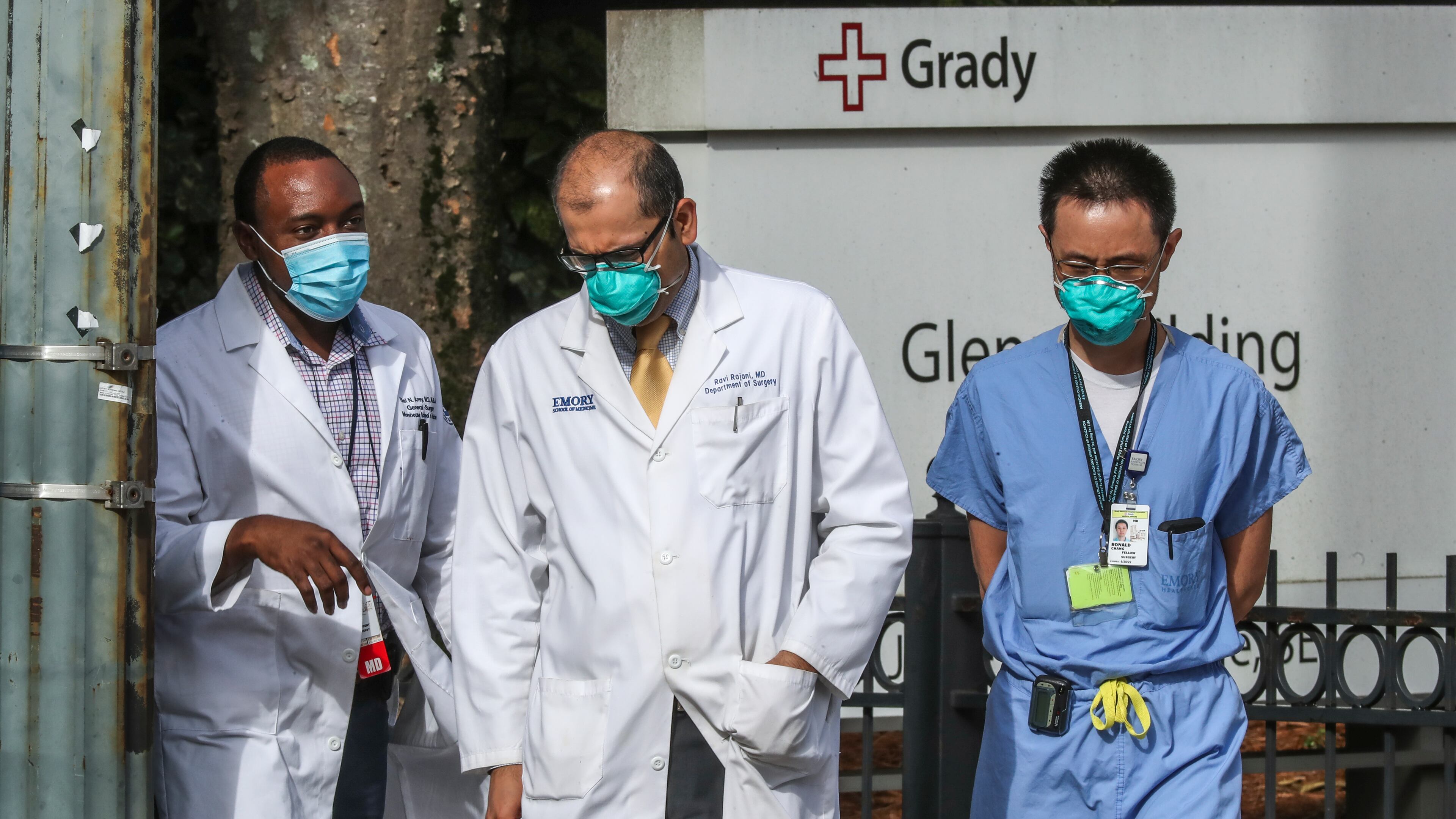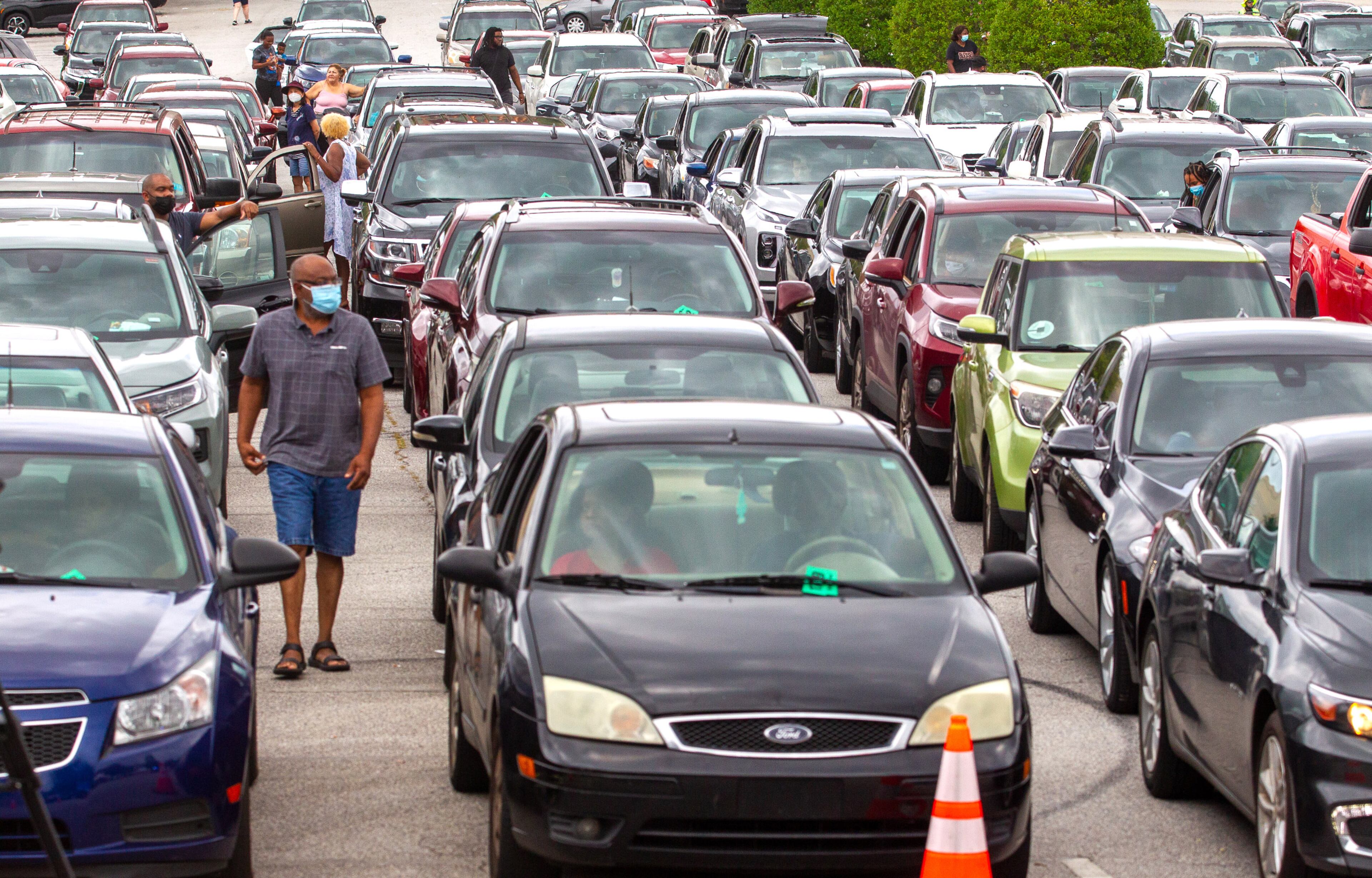Georgia’s confirmed COVID-19 death count tops 20,000

The official count of COVID-19 deaths in Georgia exceeded 20,000 on Friday, marking a sobering loss of life during a pandemic that is setting records once again as the latest surge fills hospitals and morgues across the state.
The state Department of Public Health reported 106 additional deaths in its latest update, pushing the state’s count over the latest threshold to 20,041 confirmed deaths. But COVID-19′s devastation is even greater. The state has estimated another 3,079 “probable” COVID-19 deaths so far. And the recent surge in deaths may still be largely missing from the toll because it can take weeks or months to confirm cases.
The state first reported 10,000 confirmed COVID-19 deaths in January, as the new vaccines were being administered to healthcare workers and nursing home residents. At that point, many Georgians hoped the worst of the pandemic was nearly over.
The latest numbers, though, are showing the very worst may be yet to come. Just 44% of the state’s residents are fully vaccinated. Georgia’s hospitals are fuller now than they ever have been with COVID-19 patients. New COVID-19 cases in Georgia are close to all-time highs, and the delta variant is sickening and killing younger people along with the vulnerable seniors with health problems who have been targets of COVID-19 since day one.

The latest wave claimed Janet Bruce, a popular, longtime science teacher in Gwinnett County, who was 50 years old, and Chris Bachelor, a 42-year-old Hall County deputy who worked as a school resource officer. Porter Helms, a 13-year-old boy in Floyd County, died just this week. A Buford father of four died of COVID-19 Wednesday, one week after his wife was killed in a fire at their home. Mothers and fathers, neighbors. Now, even children are being claimed by a pandemic that has delivered losses to families in every county in Georgia.
“It is tragic but not surprising that we have surpassed this grim milestone of 20,000 COVID deaths in our state,” Dr. Kathleen E. Toomey, commissioner of the Georgia Department of Public Health, said Friday. “Ninety-seven percent of COVID deaths since we’ve had vaccine are in unvaccinated individuals. These deaths are preventable.”
‘I wish’
In the Northside Hospital system, the average age of a COVID-19 patient getting admitted lately is 44, according to Dr. Doug Olson, medical director of the Emergency Department at Northside Hospital Forsyth and the system’s resident expert on COVID-19. Olson said the delta variant strikes people more quickly, with patients often showing up within three to five days of infection compared to seven to 10 days with previous iterations of the virus.
Olson said a patient in his 50s recently came into the ER who was severely sick. He needed high levels of oxygen, because his lungs were ravaged by COVID-19. Olson told the patient he would likely need to go on a ventilator within 24 hours. His prognosis was extremely poor.
“When you have to look into someone’s eyes and tell them they need to call their family and say goodbye, that is an emotional thing. It is so sad,” he said.
The patient said that while his wife got vaccinated, he “was going to wait,” Olson recalled. The patient expressed deep regret.
“The number of times I have heard, ‘I wish I had gotten the vaccine,’” Olson said. Some who are critically ill ask for the vaccine, he said, but by then it’s too late. “You just can’t go back in time.”
There are a small number of people who are vaccinated yet get moderately or seriously sick, Olson said. They are usually over age 65 and have chronic health conditions or are immunocompromised.
The number of patients Olson has attended to who are under 50, healthy, vaccinated and critically ill requiring hospitalization? Zero.
A Georgia Department of Public Health study of COVID-19 cases confirms Olson’s observations: Only about 3% of COVID-19 deaths since January have been among fully vaccinated people, the agency found.
Undercount likely
Georgia has felt the brunt of the pandemic from its beginning, when Albany became one of the hardest-hit areas of the nation. Across Georgia, more than 1.1 million Georgians have had confirmed cases of COVID-19 during the pandemic. Among the U.S. counties with the highest rates of death, Georgia has seven in the top 50. Middle Georgia’s Hancock County ranks second nationally for its death rate.
The official numbers will grow, as deaths go through the certification process that can take months. The COVID-19 deaths of several Georgia children confirmed by family members or coroners have yet to show up in the counts.
Some COVID-19 deaths may never be counted. Susan Carini’s mother died in an Atlanta nursing home last summer, days after showing COVID-19 symptoms and testing positive. Carini was upset when she saw that her mother’s death certificate didn’t even list COVID-19 as a cause. She has worked for months to try to set the record straight.
“It is hard enough to know that I am part of the group of families mourning more than 640,000 Americans who have died of the virus,” she said. “But it is harder still to know that I have no ‘proof’ of this, that I have expended time and energy, thus far without result, trying to ensure that there is an accurate record of what took my mother’s life.”
It’s become commonplace for pundits and average Georgians to question whether COVID-19 was actually killing people — or as many people as the counts suggested. Amber Schmidtke, a health care data researcher who tracks Georgia’s COVID-19 trends, said “there is no doubt in my mind” that COVID-19 has killed 20,000 Georgians — and probably more.
“In public health, more often than not, we are undercounting how widespread the problem is,” she said. That was true in the 1918 pandemic, she said, and it’s true even now.
Robert Bednarczyk, assistant professor of global health and epidemiology at Emory University’s Rollins School of Public Health, said he remembers feeling some hope when Georgia hit 10,000 deaths because vaccines were coming.
“At that point, it looked like there was maybe going to be a way out of this, that maybe we wouldn’t keep hitting some of these horribly sad milestones because we had the ability to vaccinate people and we had a good sense of the use of masks and all these other tools to try to stem the tide of the pandemic.”
Now, as Georgia hits the bleak new milestone, he’s saddened. “We have a much greater level of protection available to us,” he said. “We have vaccination. But looking at the very low vaccine coverage across the state, we’re really failing ourselves and we’re failing our communities.”

Public health researchers are watching with worry at the latest trendlines, knowing that deaths usually spike several weeks after cases surge.
On Friday, the state reported more than 9,000 new confirmed cases.
Dr. Thomas Bat, CEO of North Atlanta Primary Care, a large practice with 16 clinics throughout metro Atlanta, said COVID-19 patient volumes have risen rapidly in recent weeks and the practice routinely sees the crippling effects of long COVID, everything from brain fog to chest pain and fatigue.
“We are so tired of seeing patients sick. We are tired of all of the suffering,” Bat said. “I wish everyone could see what we see, the effects of COVID, how a person who used to be so active, a person with so much strength and energy has chronic fatigue, can’t catch their breath. We are tired of it. And then we wake up and find out half of the people won’t take the vaccine. Our message is we are in this together. Please go get vaccinated.”
Staff writer J. Scott Trubey and John Perry, technical director of the data journalism team, contributed to this article.


